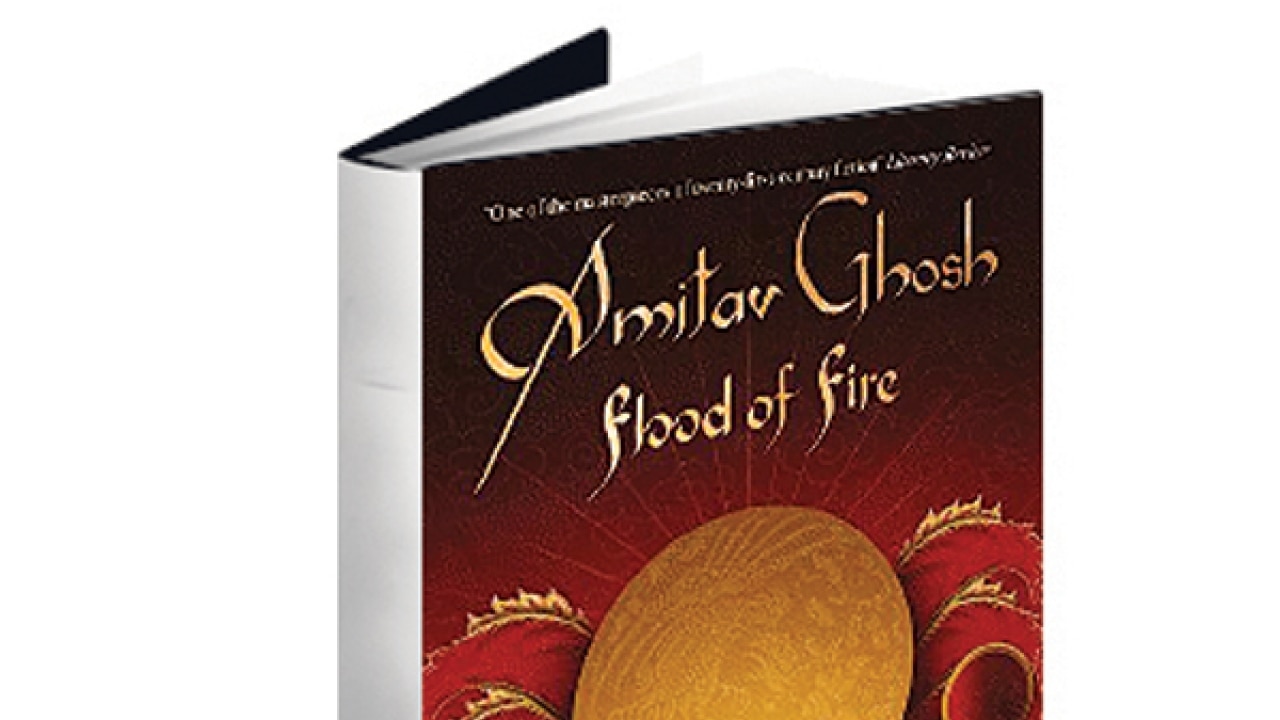
In an age where authors double up as dance show hosts, the term ‘epic’ is bandied about too liberally. But if there’s one series that deserves this epithet, it’s Amitav Ghosh’s Ibis Trilogy. From the villages of Bihar to Canton, the tale is a heady mix, much like the opium the story revolves around. In fact, one would say that Flood of Fire is actually paced faster (and the landscape is painted more beautifully) than the earlier two books.
The novel focuses on the final days leading up the First Opium War (1839) in China through the eyes of four characters – Kesri Singh (a sepoy with the East Indian Company), Neel Rattan Halder (a down on his luck zamindar who’s escaped to China), Zachary Reid (a mixed-race American sailor) and Shireen Moddie (Parsi merchant Bahram Moddie’s widow).
There are two aspects of storytelling that set Ghosh apart from his peers. The first is his ability to flawlessly switch from one narrator to another without any hurdles. The second and even more admirable aspect is the ability to combine history with fiction to create a world that’s immensely believable; a trait that puts him in the company of the very best authors.
Each of the characters in the final book bring a different perspective to the table. Kesri Singh’s character, Deeti’s older brother, gives us an insight into the life of a sepoy in the British army. Despite the camaraderie and trust that Singh shares with his white commanding officer Captain Neville Mee, there’s that hint of resentment towards the British who will never treat Indians equally.
His existential worries, particularly the question of loyalty and why Indians should fight for the British cause, make you wonder why as a nation, we didn’t revolt earlier. On the other hand, the almost paternal bond he shares with Captain Mee is endearing and shows us that not everyone blindly bought into the status quo demanded by our colonial rulers.
Meanwhile, Zachary Reid finds, that after the events of Sea of Poppies, he has again moved down in the world as he’s employed as a ‘mystery’ (mistri or craftsman) by Mr and Mrs Burnham. Zachary’s misadventures with masturbation (called onanism – an umbrella term to describe anything other than vaginal intercourse); his desire to possess riches similar to Mr Burnham by selling opium and his torrid affair with Mrs Burnham provides an interesting narrative about a white man trying to move up in the world.
Meanwhile, we have Neel Rattan Halder, who has gone from a wealthy landlord of some repute in Calcutta, to a munshi, scribe and translator in Canton. The closest thing we have to a protagonist throughout the series is Neel, and his story in this book shows us the narrative from the Chinese side. Through Neel’s eyes, we see the mighty Chinese empire come to terms with greed of the businessmen (or Free Traders) who are convinced they are doing the Lord’s work by forcing opium on the Chinese.
Finally, we have Shireen Moddie, who must not only come to terms with her husband’s death but also the fact that he had a secret family, including an offspring that she knew nothing about. It’s quite liberating to see her throw off the shackles of the purdah system to travel to China to claim what’s rightfully hers. All of their stories also show the characters rebel against the beliefs they were brought up with, showing that class and caste, are just two sides of the same coin.
It would be impossible to share any more details without spoiling the story and it’s safe to say that Flood of Fire is one of those rare tales which takes you back to an era long gone. We not only get a glimpse into the capitalistic greed that fuelled the British Empire, but their attempts to justify it (something Kipling would later call The White Man’s Burden).
The only criticism one could have of the book is that foreign readers might have trouble with the liberal use of Hindustani from time to time, but it’s not a problem that Google can’t help you overcome. It’s fair to say that with his final book, Ghosh has cemented his place among the elite of Indian fictional writers in English. All said and done, if someone had taught us history a la Ghosh, school would have been far more fun. Oh and I know it seems unlikely, but it would be amazing to see someone turn this trilogy into an epic film franchise. Are you listening Messrs Kashyap and Banerjee?